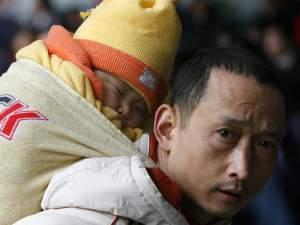It is increasingly popular for the privileged higher-ups and celebrities in China to have more than one child. Therefore, China’s government agents at all levels planned to establish a system to severely punish those who challenge China’s one-child policy by bearing a second child.
In recent years, more and more affluent people and social celebrities have born a second or third child. Based on a report by China’s Xinhuanet, Mou Weiyong, vice director of Liaoning Provincial Commission of Population and Family Planning, said that out of those who have more than one child, the number of people with high incomes is on a dramatic increase; most of them are private enterprise owners or self-employed.
According to Zhong Liyan, director of the Bureau of Population and Family Planning in Heping District, Shenyang City, the privileged and celebrities bear more than one child for two main reasons. First, they want a boy to inherit the estate; second, they want to keep the only child from feeling lonely.
Influenced by the deeply-rooted ancient Chinese culture, some people would like to fulfill their dream of having both a son and daughter after acquiring their fortune. They bear more than one child by paying the penalty. Certain sociologists condemn this phenomenon as inequality in birth rights between the haves and the have-nots.”
No Effective Measures Taken to Stop Privileged from Violating One-Child Policy
China’s government agents at all levels will be punished according to party discipline or be discharge from public employment once they fail to adhere to the one-child policy. But no effective measures have been taken to stop the rich and celebrities from bearing more than one child.
Recently, nationwide departments of population and family planning in China have decided to fine the rich and celebrities for giving birth to more than one child. Zhang Wenbiao, in charge of the population and family planning in Zhejiang Province, stated that they had planned to take actions to expose the affluent and celebrities who violate the one-child policy so as to tarnish their reputation.
Cao Jingchun, population expert of the National Commission of Population and Family Planning in China, suggested two years ago that severe punishment be imposed on the privileged who violate the one-child policy. He proposed that those who bear more than one child have to pay costs incurred by local government agents as social support expenditures. Further, it is necessary, in his opinion, that they be stripped of their titles and membership in any organization or in the National People’s Congress and in the Chinese People’s Consultative Conference.
Cao Jingchun considered China’s one-child policy a contemporary strategy for population planning which would not be enforced for a long term. Though he believed that the one-child policy would have been replaced by a two-child policy in the future, he thought it was not the right time yet to adopt the two-child policy. He insisted that at this stage, China needed to effectively stabilize the population at a low birth rate.
Experts Propose to Amend One-child Policy
Mao Yushi, a Chinese economist and president of Unirule Institute of Economics, thought that China, which has adhered to the one-child policy for over twenty years, has already crossed over into an aging society, suggested by the demographics and phenomena of daily life.
Mao said that he had seen many children during his visits abroad, but children were rarely seen in the cities in China. Primary and secondary schools in some areas were forced to close for lack of new students. This trend would only have become more noticeable in the next few years. In his opinion, it is high time for China to make proper amendments to its population policy.
A recent poll conducted in China indicates that over 60 percent of the Chinese people hoped to have two children. Yet the Chinese regime still expresses reluctance to modify the population policy this January.



Friends Read Free